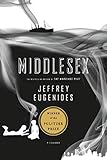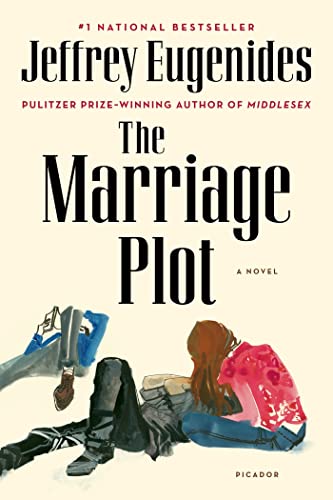Appropriately, The Marriage Plot arose from an act of literary adultery. In the late 90s, during an impasse in the writing of Middlesex, I put the manuscript aside. (I hadn’t fallen out of love, exactly, but I wasn’t sure where the relationship was headed.) Over the following weeks I began flirting with another novel, not a comic epic like Middlesex but a more traditional story about a wealthy family throwing a debutante party. At first, the new novel seemed to be everything I was looking for. It was less demanding, easy to be with, and rather nicely proportioned. Before I knew it I’d written a hundred pages – at which point the novelty wore off. It dawned on me that this new affair was going to be every bit as demanding as the book I was trying to escape. I missed Middlesex, too. I had an idea why we hadn’t been getting along. And so, with a renewed sense of commitment, almost giddy with joy, I went back to it.
 After Middlesex was published, I returned to the debutante novel. Its hundred pages were just as I’d left them. They seemed O.K. However, as I resumed work on the book, something kept bothering me. The novel felt old-fashioned. The writing was perfectly acceptable, even good in spots, but in others it felt lifeless, second-hand. The story was told from multiple points of view, in short sections of a few pages apiece. One of the characters was named Madeleine. As I wrote her section, I began to wander once again. Instead of placing her in my debutante-party plot, I began imagining her boyfriend troubles and the books she was reading, and soon I was straying off into memories of my own college days, when the craze for semiotics was at its height in American universities. Something changed in the prose I was writing as well. I can pinpoint when this shift occurred. It came with the line: “Madeleine’s love troubles had begun at a time when the French theory she was reading deconstructed the very notion of love.” The tone of this sentence differed from the tone of the rest of the book. It was more intimate, more colloquial, and more knowing. All at once, the fustiness of the book that had so displeased me dropped away. The debutante novel had felt like an actual 19th-century novel. It smelled like an old couch brought back from the flea market. In contrast, Madeleine’s section felt fresher, more energetic and alive. It sprung directly from concerns and details in my own life. When the narrative ceased to be a pallid replica of a 19th-century novel and became a novel about a young woman obsessed with the 19th-centry novel, and about what such an obsession does to her romantic expectations, the book jumped forward a century. It became contemporary and sounded contemporary and allowed me to write about all kinds of things I hadn’t been able to write about before, religion and Mother Teresa, manic depression, the class system as it operated at an Eastern university in the 1980s, Roland Barthes, J.D. Salinger, the Jesus Prayer, and Talking Heads. Pretty soon, I had over a hundred pages of this new section.
After Middlesex was published, I returned to the debutante novel. Its hundred pages were just as I’d left them. They seemed O.K. However, as I resumed work on the book, something kept bothering me. The novel felt old-fashioned. The writing was perfectly acceptable, even good in spots, but in others it felt lifeless, second-hand. The story was told from multiple points of view, in short sections of a few pages apiece. One of the characters was named Madeleine. As I wrote her section, I began to wander once again. Instead of placing her in my debutante-party plot, I began imagining her boyfriend troubles and the books she was reading, and soon I was straying off into memories of my own college days, when the craze for semiotics was at its height in American universities. Something changed in the prose I was writing as well. I can pinpoint when this shift occurred. It came with the line: “Madeleine’s love troubles had begun at a time when the French theory she was reading deconstructed the very notion of love.” The tone of this sentence differed from the tone of the rest of the book. It was more intimate, more colloquial, and more knowing. All at once, the fustiness of the book that had so displeased me dropped away. The debutante novel had felt like an actual 19th-century novel. It smelled like an old couch brought back from the flea market. In contrast, Madeleine’s section felt fresher, more energetic and alive. It sprung directly from concerns and details in my own life. When the narrative ceased to be a pallid replica of a 19th-century novel and became a novel about a young woman obsessed with the 19th-centry novel, and about what such an obsession does to her romantic expectations, the book jumped forward a century. It became contemporary and sounded contemporary and allowed me to write about all kinds of things I hadn’t been able to write about before, religion and Mother Teresa, manic depression, the class system as it operated at an Eastern university in the 1980s, Roland Barthes, J.D. Salinger, the Jesus Prayer, and Talking Heads. Pretty soon, I had over a hundred pages of this new section.
The irony was clear: here I was, cheating on a novel that had once been my mistress! Madeleine’s section just kept getting longer. The longer it got, the more I liked it. Over the course of a painful two weeks, I surgically separated the two manuscripts, taking out three of the characters – Madeleine, Mitchell, and Leonard – and giving them their own book.
I didn’t know, at that point, that the book would be called The Marriage Plot, or that it would have anything to do with marriage. But gradually, as I pushed forward with the book, other things I’d been thinking about began to make their way in. In 2004, for the online magazine Slate, I had discussed the legacy of Joyce with the novelist Jim Lewis. During that exchange, I lamented the fact that the marriage plot, which had given rise to the novel, was no longer available to the modern novelist. In my book The Marriage Plot, I put these slightly reactionary thoughts into the mouth of Madeleine’s elderly thesis director, Professor Saunders:
In Saunders’s opinion, the novel had reached its apogee with the marriage plot and had never recovered from its disappearance. In the days when success had depended on marriage, and marriage had depended on money, novelists had had a subject to write about. The great epics sang of war, the novel of marriage. Sexual equality, good for women, had been bad for the novel. And divorce had undone it completely. What would it matter who Emma married if she could file for separation later? How would Isabel Archer’s marriage to Gilbert Osmond have been affected by the existence of a prenup? As far as Saunders was concerned, marriage didn’t mean anything anymore, and neither did the novel.
It didn’t happen right away. But as I wrote about my three undergraduates, describing the end of their time at university and the beginning of their adult lives, such academic thoughts as these attached themselves to my story and provided me with a solid structure for the book. Instead of writing a marriage plot, I could deconstruct one and then put it back together, consistent with the religious, social, and sexual conventions prevailing today. I could write a novel that wasn’t a marriage plot but that, in a certain way, was; a novel that drew strongly from tradition without being at all averse to modernity.
That’s the intellectual background of The Marriage Plot. But you don’t write a novel from an idea, or at least I don’t. You write a novel out of the emotional and psychological stuff that you can’t shake off, or don’t want to. For me, this had to do with memories with being young, bookish, concupiscent, and confused. Safely in my 40s, married and a father, I could look back on the terrifying ecstasy of college love, and try to re-live it, at a safe distance. It was deep winter in Chicago when all this happened. Every day I looked out my office window at snow swirling over Lake Michigan. After separating the two books, I put one in a drawer and kept the other on my desk. I ran off with The Marriage Plot and didn’t look back. I changed completely, became a different person, a different writer; I started a new life with a new love, and all without ever leaving home.










